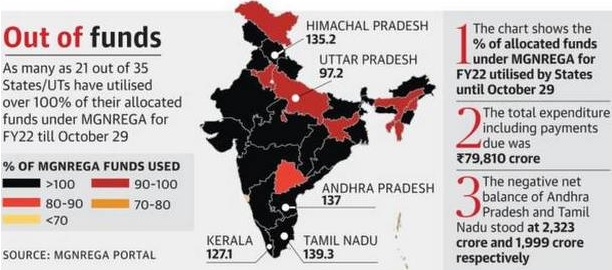(Mains GS 2 & 3 : Welfare Schemes for Vulnerable Sections of the population by the Centre and States and the Performance of these Schemes & Indian Economy and issues relating to Planning, Mobilization of Resources, Growth, Development and Employment.)
Context:
- The Centre’s flagship rural employment scheme Mahatma Gandhi Rural Employment Guarantee Scheme (MGNREGS) has run out of funds as 21 of 35 States/UTs have utilised over 100% of their allocated funds for FY2021-22.

Scheme for unskilled:
- The MGNREGA is a demand driven scheme, guaranteeing 100 days of unskilled work to any rural household that wants it.
- During last year’s COVID-19 lockdown, the scheme was ultimately given its highest budget of ₹1.11 lakh crore and provided a critical lifeline for a record 11 crore workers.
- However, the scheme’s 2021-22 budget was set at just ₹73,000 crore, with the Centre arguing that the nationwide lockdown was over and that supplementary budgetary allocations would be available if money ran out.
- As on October 29, the total expenditure including payments due had already reached ₹79,810 crore, pushing the scheme into the red.
- Already, 21 States show a negative net balance, with Andhra Pradesh, Tamil Nadu and West Bengal faring the worst.
Life saver for poor:
- MGNREGS was a life-saver for the poor, especially migrant labourers, following the sudden lockdown announced by the Union government.
- By October-end, Kerala, Tamil Nadu, Andhra Pradesh and Himachal Pradesh had utilised more than 130% of their respective allocations for the scheme, indicating the extent to which rural workers depend on the scheme even in relatively better-off States.
- It also shows that the government has underestimated the demand for work under the scheme, which even if it involves arduous and menial labour has accounted for a large chunk of rural employment at a time when the economy suffered a steep contraction due to the effects of the pandemic.
The tussle:
- The government of India officials blamed State governments for the current situation of ‘artificial’ demand as the States are using it not as a demand driven scheme, but as a supply led scheme.
- The States are asking their field authorities to artificially create demand however the nature of the scheme is that once people turn up and demand jobs, then the demand is provided.
Claims of civil society:
- MGNREGA data shows that 13% of households who demanded work under the scheme were not provided work.
- The civil society activists claim that some workers have been turned away by officials despite the demand for work because of the paucity of funds.
- Thus the Union Government must ensure that the allocation is adequate for wage payments to be done and for demand to be met in the remaining months of this financial year.
Utility of the scheme:
- The utility of MGNREGS as a scheme that alleviates distress has always been recognised.
- Scheme acts as an effective substitute in the absence of crop and weather insurance in aiding poor farm households and helping to provide wages during agrarian crises.
- It also acted as an avenue for employment during the economic crisis induced by the pandemic and the response, MGNREGS has turned out to be a salve for farm workers and labourers.
Conclusion:
- Besides the scheme’s utility in distress, it also has the potential, if works are upgraded suitably, to continue to improve rural development and infrastructure.
- Thus delays in wage payments could result in a decline in rural consumption, which plays a vital role in stimulating the economy.